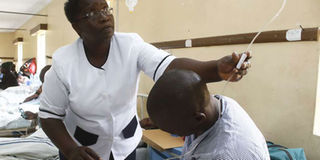How Kenya can attain universal healthcare

A nurse at Nakuru Level Five Hospital attends to a patient on March 26, 2018. The right to health is entrenched in the Constitution. PHOTO | AYUB MUIYURO | NATION MEDIA GROUP
What you need to know:
- With health now devolved, inadequate funding of counties imposes further financial constraints on the system.
- We must streamline the cost of healthcare provision to curb exploitation of patients by unscrupulous health providers.
Universal healthcare being one of the pillars of President Uhuru Kenyatta’s ‘Big Four’ agenda, the political will to achieve quality, affordable health coverage is not in doubt.
The right to health is entrenched in the Constitution.
Article 43 states that every person has the right to the highest standard of health and no one should be denied emergency medical treatment.
Vision 2030, Kenya’s roadmap to a middle-income economy, prioritises health as a major component of the social pillar.
An analysis of the system reveals a cocktail of challenges hindering optimal delivery of universal healthcare despite it being so strongly anchored in law and policy.
POVERTY
First, most Kenyans cannot afford treatment and medication and the rising high cost of doctor consultations and medical procedures have pushed healthcare beyond their reach.
Research shows 32 per cent of households’ health budget is financed out of pocket as State and non-governmental actors account for 31 per cent and 32 per cent, respectively. Health insurers finance 13 per cent.
Given that Kenyans pay directly for a larger chunk of medical expenses, the surging cost of healthcare has had a direct adverse effect on households.
The high prevalence of poverty aggravates barriers to healthcare access by the majority.
REGULATION
Second, there is lack of a clear legal framework on computation of the cost of treatment and medicines.
Healthcare value chain actors — including hospitals, pharmacies and drug suppliers — are not effectively regulated regarding fees and prices.
This opacity makes it difficult to ascertain the reasonable cost of healthcare in Kenya.
Third, public health facilities are underfunded. Government spending on healthcare is just six per cent of gross domestic product (GDP).
This is low compared, for instance, to education or infrastructure.
DEVOLUTION
With health now devolved, inadequate funding of counties imposes further financial constraints on the system.
Throw in recurrent strikes by health personnel and one begins to fathom the enormity of the crisis in the system.
Inadequate funding compromises quality and availability of health services.
Due to dilapidated public health facilities, many Kenyans resort to the more expensive private health outlets.
In addition, most public hospitals suffer a chronic lack of drugs, forcing patients to turn to private pharmacies.
FUNDING
The rising prevalence of non-communicable diseases such as cancer has further strained the health system and impoverished many families.
These diseases are expensive to treat and involve protracted medical procedures and care.
These challenges undermine the ability of our health system to deliver universal healthcare.
We must streamline the cost of healthcare provision, including consultation fees and medicines, to ensure predictability and curb exploitation of patients by unscrupulous health providers.
A well-managed cost regime also encourages health insurers to lower premiums, enhancing coverage, directly reducing the burden on households.
The government should also increase public health funding at county and national levels and expand and modernise our healthcare infrastructure.
CAPITATION
Finally, we need to create incentives for service providers to tame the escalating costs.
Capitation for service providers in lieu of the fee for service would allow for patients to pay for only what they need and reduce the tendency of health providers to prescribe unnecessary medical procedures and medication.
These measures, taken in totality, will certainly make universal health coverage an attainable goal for Kenya.
Ms Munene is group managing director, AAR Insurance. [email protected]




